Air Conditioner Considerations for a Healthier Household
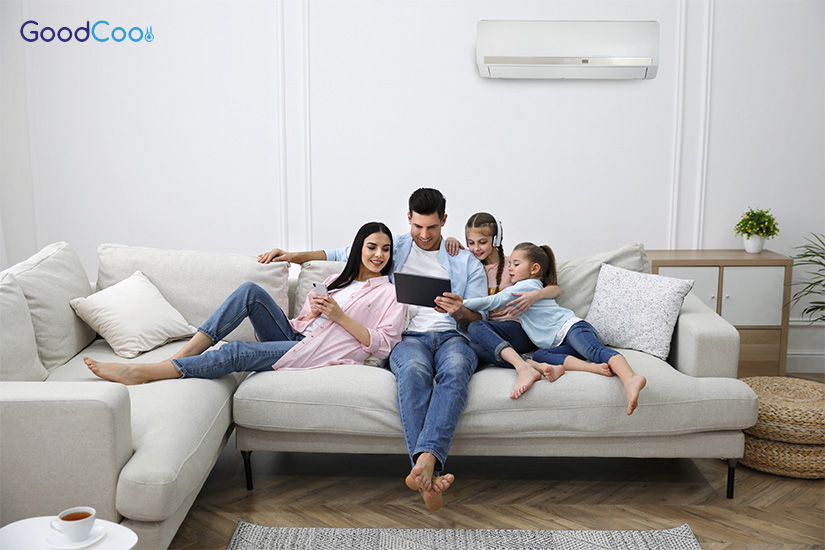
In Singapore’s hot and humid climate, air conditioners are essential for maintaining a comfortable living environment in your household. But did you know that your air conditioner can also greatly influence your family’s health and well-being?
This article explores essential considerations for families when using air conditioners, highlighting how to create a healthier indoor environment, address common allergens, and promote energy efficiency—all while making comfort a priority.
Creating a Healthy Environment for Children and Elderly
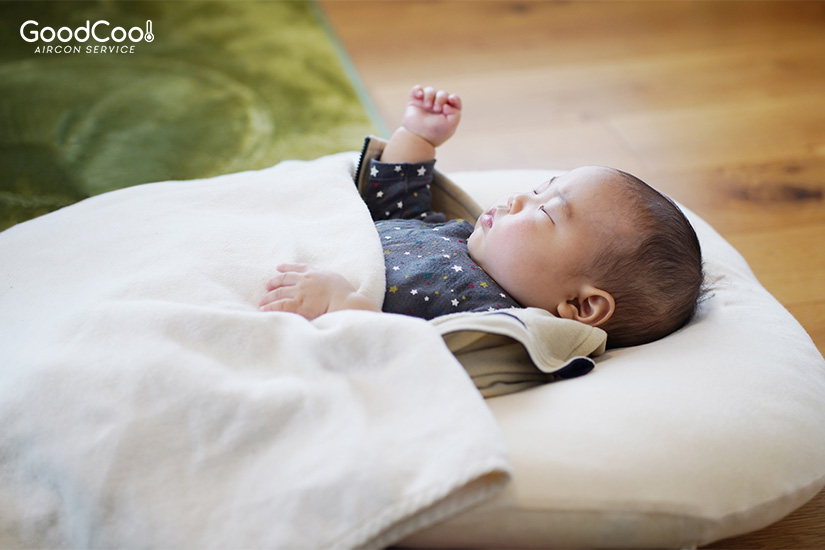
Young children and elderly members have specific needs when it comes to indoor climate control. Make sure to take these into account when using your household air conditioner.
1. Temperature Regulation
Extreme temperatures can pose health risks for children and the elderly, as their bodies are less efficient at regulating temperature. Excessive heat can lead to heatstroke, while prolonged exposure to lower temperatures can cause chills and even worsen respiratory problems.
To ensure your loved ones’ health and comfort, maintain an indoor temperature of 20°C to 24°C. This stable temperature range helps keep bodies regulated and comfortable, making them less prone to illness and improving their wellness overall.
2. Ease of Use
Opt for a family-friendly air conditioning system with user-friendly controls. This allows elderly family members, individuals suffering from cognitive decline, or those unfamiliar with complex technology to operate them easily. Touchscreen controls, simple remotes, and smart systems with voice-activated or app-based controls enable everyone to adjust the temperature without hassle.
3. Monitoring Systems
Smart thermostats allow you to monitor and adjust the air conditioning in your household remotely. This allows you to keep children and elderly loved ones comfortable throughout the day, even if you’re not home. You can even program schedules that automatically adjust the temperature based on your family’s needs. If you have a busy schedule that frequently takes you out of the house, these systems can give you peace of mind, knowing that the temperature in your home is always adjusted to your loved ones’ needs.
4. Noise Considerations
With a quiet household air conditioner, infants and toddlers can sleep peacefully, children can concentrate on homework, and elderly grandparents can enjoy peace and quiet. Thus, it’s best to choose an aircon system with advanced soundproofing features like low-decibel operation, vibration isolation technology, and quiet fan modes to reduce disruptive noise.
Pet-Friendly Aircon Maintenance
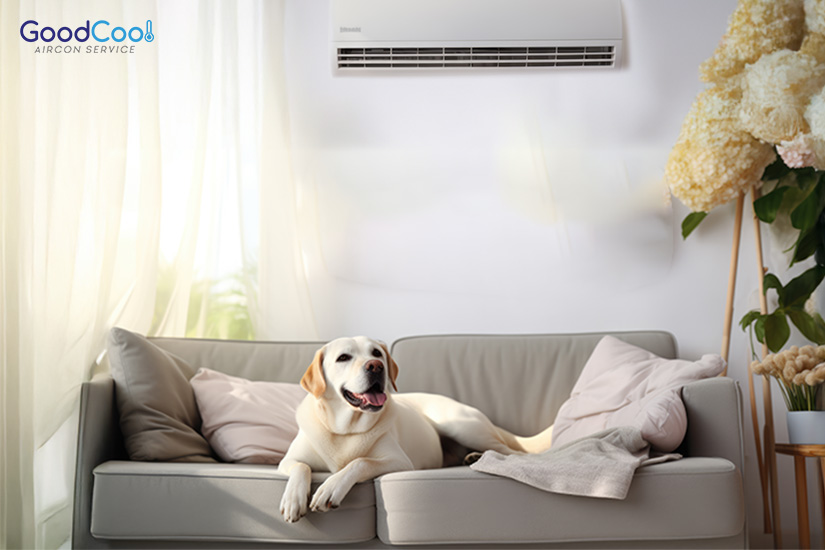
It can be difficult to maintain indoor air quality when you have furry friends at home. Here are some tips for keeping your air conditioner running smoothly and your household clean.
1. Filters
The right air conditioner filters are essential for capturing pet dander, fur, and other allergens. Look for units with HEPA filters, which are specifically designed to capture tiny particles including pet dander, pollen, dust mites, and other allergens that can trigger respiratory issues. Additionally, activated carbon filters can help absorb pet odours and other unpleasant smells, keeping your home smelling fresh and clean.
2. Clean and Change Filters Regularly
Pet hair and dander can eventually clog even the most advanced of air filters, reducing the effectiveness of your household air conditioner. Depending on the type of filter you have and the number of pets in your household, you may need to clean and change your filters every 1-3 months.
3. Duct Cleaning
Similarly, pet hair can accumulate in air ducts over time, reducing your air conditioner’s efficiency and reintroducing allergens into the air. To prevent this, it’s important to schedule an aircon general servicing at least once every year to remove built-up debris. This will go a long way in improving airflow and keeping your system at peak efficiency.\
4. Monitoring Indoor Air Quality
Finally, consider adding air quality monitors to your home. These devices measure the concentration of various airborne particles and provide real-time data on the air quality in the room. With this information at hand, you can take proactive steps to improve air quality, such as adjusting your aircon settings, using an air purifier, or cleaning filters more frequently. Monitoring the air quality helps reduce exposure to potential allergens and pollutants, allowing you to enjoy the company of your furry friends, worry-free.
Addressing Allergens and Pollutants
For individuals suffering from allergies and respiratory problems like asthma, effective allergy management is key. Here are some ways to use your air conditioner and other strategies to reduce allergens and pollutants in your household:
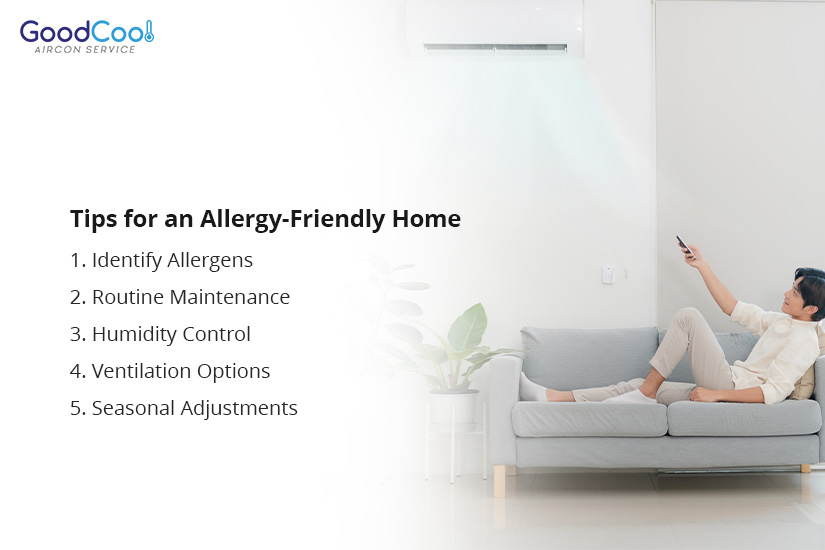
1. Identify Allergens
The first step in allergy management is identifying the common allergens in your home, which typically include dust mites, pollen, mould, and pet dander. Understanding which allergens trigger your symptoms allows you to choose the best air conditioning system for your needs. For example, a system with mould-resistant features can help prevent mould growth, which is a particularly prevalent issue in Singapore’s humid climate
2. Routine Maintenance
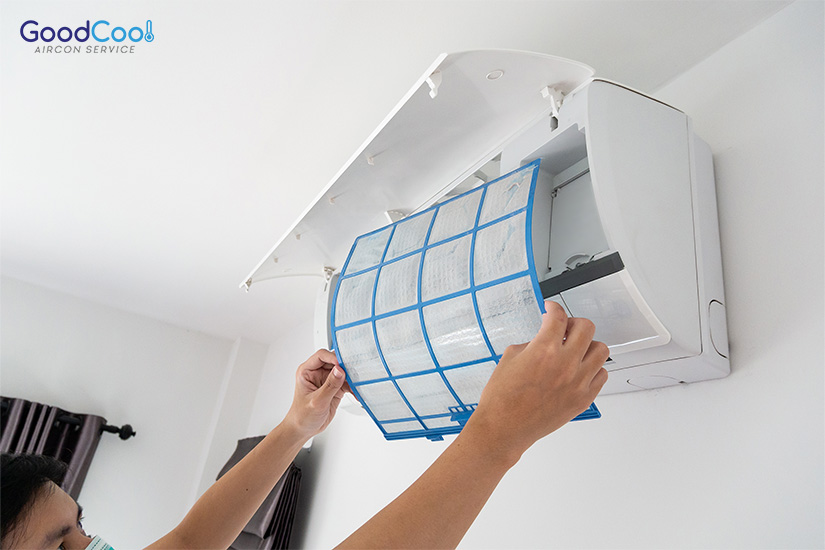
Regular maintenance helps to ensure that it operates efficiently and effectively filters out allergens. During servicing, the air filters are cleaned or replaced, preventing the buildup of dust, pet dander, and pollen that could circulate through your home. The evaporator coils are also cleaned to ensure optimal airflow, which helps reduce the spread of mould spores. Additionally, a chemical wash or overhaul can remove accumulated dirt and debris from the internal components, further improving the air quality and the system’s overall performance.
3. Humidity Control
An effective household air conditioner should regulate indoor humidity, as high moisture levels promote the growth of mould and dust mites. Maintaining the indoor humidity level between 40% and 60% helps prevent these allergens from thriving, creating a more comfortable environment for allergy sufferers. Moreover, controlling humidity also reduces dampness and improves the cooling performance of your aircon unit.
4. Ventilation Options
Proper ventilation allows fresh air to circulate and replace stale polluted air. In addition to your household air conditioner, exhaust fans can significantly improve ventilation by expelling indoor pollutants and facilitating better air exchange. For areas with higher allergen levels, portable air purifiers equipped with HEPA filters offer an extra layer of protection by efficiently trapping allergens and improving overall air quality.
5. Seasonal Adjustments
During certain times of the year, the air is often filled with higher levels of pollen and other airborne allergens. A key example in Singapore is the haze, typically occurring between June and October when smoke from forest fires in neighbouring countries affects air quality.
During these periods, it’s best to keep your windows closed and run your air conditioner more frequently. This will help provide relief during high-allergen periods and ensure a more comfortable living space.
Energy Efficiency and Cost-Effectiveness
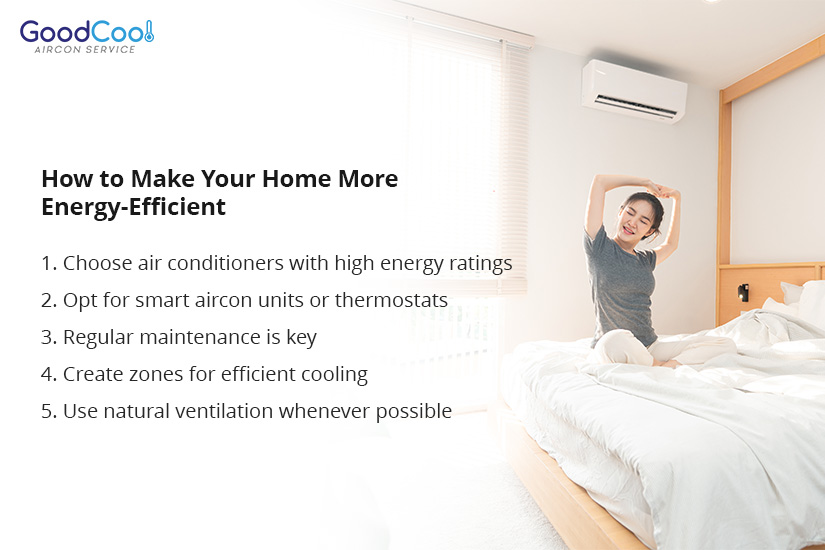
In Singapore, approximately 41% of residents rely on their air conditioners for 3-6 hours daily to combat the tropical heat and humidity. While this practice offers respite from the sweltering climate, it can also lead to substantial energy consumption and increased electricity bills.
To reduce your bills and carbon footprint, here are some tips for choosing and using an energy-efficient household air conditioner:
1. Energy Ratings
When shopping for an air conditioner for your household, always look for those with high energy ratings, such as SEER (Seasonal Energy Efficiency Ratio) ratings. The SEER rating indicates how efficiently an air conditioner operates for a season, with higher ratings reflecting better energy efficiency. Units with a higher SEER rating consume less electricity to cool the same amount of space, translating to significant cost savings on your monthly energy bills.
2. Smart Air Conditioners
Smart air conditioners are capable of learning your family’s routines and automatically adjusting the temperature based on when rooms are occupied. For example, if you’re away at work or school, the thermostat can raise the temperature to avoid unnecessary cooling, then lower it again before you return home. This energy-efficient cooling solution ensures comfort without wasting energy.
3. Regular Maintenance
Regular maintenance is essential for ensuring optimal performance, reducing the risk of breakdowns, and extending the lifespan of your unit. Regular checks, including cleaning or replacing filters and inspecting refrigerant levels, help to prevent common issues like aircon leaks or the unit not cooling effectively. By addressing minor problems early on, you can avoid costly repairs and maintain a comfortable indoor environment throughout the year.
4. Zoning Systems
Divide your household into different cooling zones, each with its own air conditioner. This not only allows you to control the temperature in specific areas but also maximise your system’s effectiveness. By cooling only the rooms that are occupied and reducing airflow to unused spaces, you eliminate unnecessary energy consumption while keeping the areas you use most at the perfect temperature.
5. Use Natural Ventilation
During cooler parts of the day, such as early mornings or late evenings, consider using natural ventilation by opening windows to allow fresh air to circulate throughout your home. This reduces your reliance on the air conditioner and allows your home to stay naturally cool without using additional energy.
Frequently Asked Questions for Air Conditioners in Households
What should I do if my air conditioning system is not cooling effectively?
If the air conditioner in your household isn’t cooling as it should, follow the steps below:
- Verify that the thermostat is set to the correct cooling settings.
- Inspect and clean the air filters.
- Check the outdoor unit for obstructions like leaves, debris, or dirt.
If these steps are unable to resolve the problem, the issue could be related to refrigerant levels or ductwork blockages and may require professional cleaning or AC gas top-up.
What should I do if my aircon unit is leaking water?
If your air conditioner is leaking water, the first thing to check is whether the drain line is clogged. A blocked condensate drain can cause water to back up and leak from the unit. You should also inspect the air filter, as a dirty filter can restrict airflow and cause the evaporator coil to freeze. It will eventually melt, to water leakage. If the issue persists after cleaning the filter and drain line, it could indicate a more serious problem, such as a refrigerant leak or damaged internal components.
My aircon unit is making strange noises. What should I do?
If your household air conditioner is making strange noises, it could indicate an underlying issue. Common causes include a loose or worn-out fan, debris in the unit, or problems with the compressor or motor. If you hear rattling, squealing, or grinding noises, it’s important to turn off the unit and have it inspected by a professional.
How can I improve indoor air quality besides using air conditioning?
Improving indoor air quality in your household is not solely reliant on air conditioners. Besides keeping your aircon system well-maintained, you can introduce HEPA air purifiers to capture even the smallest airborne particles. Indoor plants also have natural air-purifying properties, absorbing toxins and releasing oxygen. Finally, cleaning, dusting, and vacuuming regularly will help minimise allergens and other pollutants.
How long does an aircon unit typically last?
The average lifespan of a well-maintained household air conditioner is typically between 10 to 15 years. However, this can vary depending on factors like the frequency of use, the quality of the unit, and how well it has been maintained over the years. Regular maintenance, including aircon general servicing, is crucial in extending the life of your air conditioner.
How do I know if I need a chemical wash or chemical overhaul for my air conditioner?
If your household air conditioner is not cooling effectively, emitting unusual smells, or showing signs of mould buildup, it may be time for a chemical wash or overhaul. A chemical wash is typically recommended when there’s dirt and dust buildup in the system, while a chemical overhaul is more extensive and is needed when there are issues like clogged coils, refrigerant problems, or severe contamination.
If you’re unsure, it’s best to consult with professionals who can assess your system’s condition and recommend the appropriate service.
Conclusion
Investing in a high-quality air conditioner and maintaining it properly is key to creating a healthy home for your household. With the right features and usage, your air conditioner can reduce allergens, improve energy efficiency, and provide comfort and safety for everyone.
At GoodCool, we offer affordable aircon services, from installation to maintenance, ensuring your home stays comfortable and healthy year-round. Our team of expert technicians is dedicated to providing you with energy-efficient, family-friendly solutions tailored to your needs.
Contact us today to find out how we can help.
